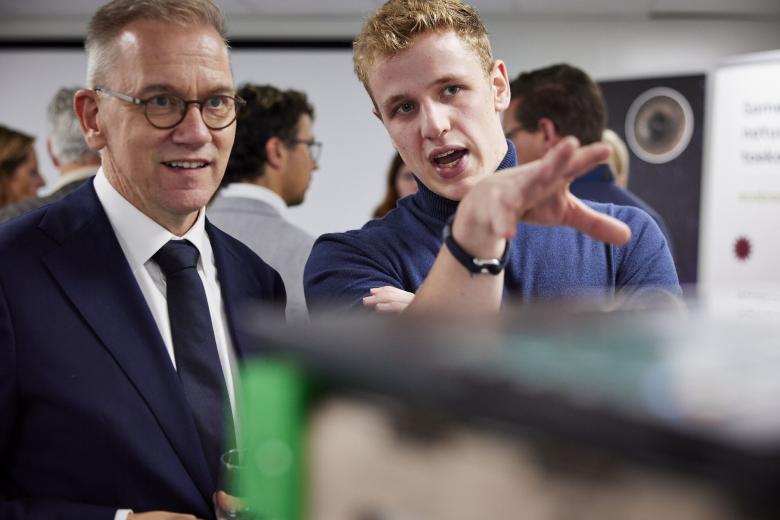In many industries today, a few "superstar" firms dominate while many others lag behind.
As an employer, Maastricht University, including its faculties and services, is responsible for pursuing a prevention policy on working conditions. The prevention policy should be aimed at preventing illness and absenteeism by ensuring a safe and healthy working and study environment.
On behalf of the university-wide health and safety policy, MUO-HRM's head of health and safety at work has been appointed.
Important actors are the Risk Inventory & Evaluation (RI&E), workplace investigation (WPO), company doctor and working conditions consultation, Arbo Committee Randwyck (ArboCie), Prevention Officer and the Armico.
To provide direction in this regard, the Randwyck Arbo Committee (ArboCie) was established, the advisory body for working conditions in Randwyck. Proposals to improve working conditions are submitted to the ArboCie, after which the proposal is adopted and implemented by the Faculty Board.
The prevention officer deals with health and safety in the workplace, advises on occupational risks and resulting measures and includes the following tasks:
- Responding to and resolving issues and comments on working conditions;
- Providing solicited and unsolicited advice to employees and managers on working conditions;
- Identifying risks in the field of safety, health and welfare;
- Participating in the implementation and drafting of the Risk Inventory and Evaluation (RI&E);
- Co-drafting and monitoring the implementation of the action plan resulting from each RI&E and any audits;
- Contributing to the Randwyck Health & Safety Committee and coordinating decisions with managers.
- Organising information and instruction to the Armico, employees and students;
- Subject matter boss of the Armico and responsible for the (post-) training of the Armico.
Armico
To support the department chairperson/department head in the area of prevention for working conditions, within the FHML and FPN, the Armico (ARbo and MIlieu COntact person) have been appointed at each department/department.
The armico plays a central role with regard to prevention in the areas of ergonomics, climate, lab safety and environment. The Armico's tasks include:
- Acting as an enquiry point A & M matters for managers, staff and students within the unit;
- Providing solicited and unsolicited advice to employees and students on A & M aspects;
- Introduction of new employees
- Carrying out workplace surveys (WPO)
- Provide input in the preparation of the unit's Risk Inventory & Evaluation, Plan of Action and assist in its implementation;
- Assist in A&M information transfer within the unit;
- Encourage A & M aware behaviour;
- Provide support in incident or accident investigations;
- Signalling improvements in the field of A & M;
- Participating in Audit groups;
- Providing information and support for building-related activities.
Psychosocial Workload
Psychosocial Workload (PSA), such as bullying, (sexual) harassment, discrimination and work-related stress as a result of long-term exposure to work pressure, must be prevented within UM at all times. The prevention officer has a signal function in this respect and can support the employee by suggesting the right channels within UM.
What does the confidential advisor do?
Better in balance
Risk Inventory & Evaluation
The Risk Inventory & Evaluation (RI&E) is an important instrument in the improvement cycle for healthy and safe working conditions for employee and students. The RI&E covers all aspects of the ABRO Act and is carried out modularly at the faculties FHML and FPN. For further information, please contact the prevention officer.
Vaccination
Within Maastricht University, work is carried out with human material. The university has a preventive policy regarding the prevention of Hepatitis B infections and offers a hepatitis B vaccination for staff and student s who work or will work with human material. For further information contact the prevention officer.
For the purpose of working safely with chemicals, biological agents, radiation and laboratory animals, specific work clothing is prescribed. This clothing varies, for example, from a full outfit for operations or working with Carcinogenic, Reprotoxic and/or Mutagenic substances (CRM substances) to the use of appropriate clothing for staff carrying out maintenance work on equipment.
More information regulation company clothing.
For questions contact the prevention officer for the regulation on industrial clothing FHML.
Laboratoy animal allergy
Allergy is known to be a health risk when working with laboratory animals. Without appropriate measures, one third of employees working with laboratory animals develop a hypersensitivity to allergens from laboratory animals. The allergens are mainly found in excretions of the laboratory animals such as urine, faeces, dander and hair. Measures have been taken to prevent exposure. UM also offers the PAGO (Periodic Occupational Health Examination) for laboratory animal allergy. The prevention officer can support you and provide you with advice to reduce exposure to laboratory animal allergens.
We are also able to connect you to other experts within the university. Previous consults have included evaluating education, linking learning activities and assessment and providing inspiration for designing new courses.
The Working Conditions Law (in Dutch: Arbeidsomstandighedenwet) stipulates that every employee has the right to a safe and healthy workplace. Employers have a duty to ensure good working conditions (arbo), in consultation with employees. Within the Maastricht University (UM), Faculty of Health, Medicine and Life Sciences (FHML) and Faculty of Psychology and Neuroscience (FPN), the occupational hygienist and prevention officer have various areas of attention for this purpose.
The main task is to support the employer in taking care of daily health and safety and provides support to all employees and students of FHML-FPN when working at UM.
The Health and Safety officers have knowledge of the organisation's occupational risks and the preventive measures to be taken. They are expert employees within the company who advise on working conditions. The occupational hygienist focuses mainly on factors that can cause health damage in the longer term. Think, for example, of working in noise, or working with hazardous substances. The occupational hygienist (AH) can also support with questions about ergonomics or climate. In addition, Health and Safety manages the hazardous chemical registration system SOFOS360 and offers administrative support in the implementation of the opium-law dispensation at FHML. The AH and prevention officer also advise on renovations and refurbishment to comply with legal regulations and guidelines. Finally, the prevention officer provides training for the Armico’s and the AH gives instruction to (laboratory) employees, students and third parties. For biological safety, UM has appointed the Biological Safety Officer (BSO).
Health and Safety is involved in drawing up the Risk Inventory and Evaluation (RI&E) and the associated plan of action. They also play an important monitoring role in implementing the measures arising from the action plan. In doing so, they advise and cooperate with the works council and ARBO committee Randwyck.
Opportunities and concerns take centre stage during Minister Bruins' working visit to Maastricht
- Corporate
- UM news
On Friday afternoon, 18 October, Minister Eppo Bruins (Education, Culture, and Science) paid a working visit to Maastricht.

